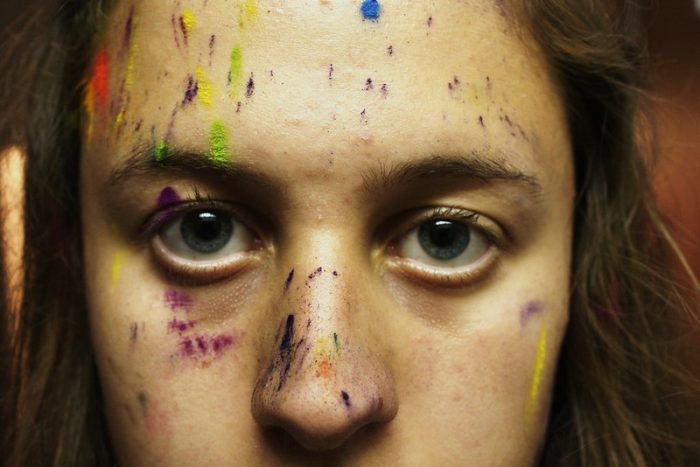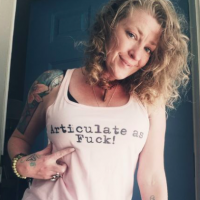You’ve heard it before and I’ll say it again, we have to feel to heal.
Emotional bypassing, whether spiritually or socially dressed, will not staunch the weeping wounds of our souls. If we want to heal, and genuinely be of benefit, we need to stop playing nice and get real.
As a healer and hypnotherapist, I sit with trauma for a living. People share things with me they’ve never told another person. Some of those things are horrific.
A man who shares that he was raped by his priest. Is that nice? Am I supposed to have a nice reaction? No. I have murderous rage at the desecration of innocence. I don’t act on it, but it’s there. How can he purge the pain of his own violation, if keeping a nice front is more important than honesty?
He can’t. I’ve done the work—I know.
Bypassing our emotional pain to play nice is deadly. It doesn’t go away because we don’t like it. It festers in our cells. It may become physical pain or illness. I had womb pain for years until I embraced my blood cycle, and tended to the memories of certain violations.
Unprocessed pain may become codependent tendencies or addictions, anything to avoid feeling the pain of absence—the loss of ourselves. I did that too, sticky relationships with substances and men.
Staring at my computer screen, I pine for companionship, yet I just snapped at my mother instead of stating a boundary.
After living alone for the last year and half, for the first time in my life—I crave solitude.
Snapping at my mom was me slipping, momentarily back into my too niceness. I needed to tell her to go to her room, to tell her—I need space. Instead, I let passive-aggressiveness creep in, loud and annoyed, it said in tone the words I couldn’t form in the moment—leave me alone.
Nice young ladies don’t fill in the blank. There’s about a thousand things we aren’t supposed to do. I imagine telling our mothers to go away is just one of them. Others are “don’t be too sexy, don’t have needs, don’t talk about your body, don’t stand up for yourself, don’t make the first move, let men come to you. Let life come to you.”
There is no denying that women—in part, due to the nature of our wombs—are powerful magnets. A womb doesn’t run around seeking to be inseminated; it sits, dark and mysterious in our pelvic bowls, humming its own tune, waxing and waning with the moon. Listening to its song has made me less nice.
My body pulses with power, incapable of sitting like a wallflower, it demands to dance, to move, to writhe, and be seen.
It’s taken years to claim the body I dwell in, years to unwrap my own and others’ misplaced pain, to fill every curve and own every wiggle, jiggle, and bounce, to stand erect in my full five-foot nine figure without shrinking—without apology.
Shrinking in my body is also shrinking in my life. If I am trying to make myself smaller physically, I am also not giving myself permission to stretch my skills or fully offer myself in service.
There is a curious correlation between my sexuality and creativity. When I shrink myself in any capacity, I suffer. Shrinking is unacceptable to me. I fill my space, my skin, and beyond.
I am sexual, as well as creative. I like looking as well as being seen; checking out men when we are in the sauna together, locking eyes and smiling on the hiking trail, casually warm and friendly. I enjoy the natural exchange of mutual appreciation between the sexes.
I also like telling anyone to f*ck right off if they cross a line. I was not always like that. I used to say yes more than I meant it, and it got me into messes that made me like myself less than I deserve.
As a woman who has endured multiple sexual violations—from subtle yet destabilizing, to date rape, to having to vocally intimidate a guy into not assaulting me—I don’t take kindly to having my boundaries crossed.
Even in the appropriate expression of my power, I find myself minimizing the last violation I experienced because it was just a text and he was a friend.
You see, she’s still there—that too, nice me.
So, I listen to what she has to say because aggression against her, against myself, will not help. She is timid and frightened and she is, well—me.
Don’t leave me, she whispers. And there it is, my longtime fear—abandonment. How are you, old friend? Cold and hollow, and lonely, the reply echoes forlornly from my belly.
This is why I was too nice in the first place. If I am good enough, nice enough, if I just learn to swallow my needs and feelings, put up with your sh*t—will you not leave me? Sadness, insecurity, and anger seethe, surfacing and setting free fresh tears.
I know this pain, this childhood wound. She learned how to be pretty and entertaining. That was what they wanted, blond curls bobbing, agreeably. I see her now. She was not an abused child, not in that scene. She was a doll.
Now, I am a woman—wild and powerful.
When we bury our hurt, our innocence gets buried right alongside it, and we cannot unearth one without retrieving the other. It’s not nice. It’s messy and scary as hell. We are removing masks once painted with placations, and tending to the trauma underneath.
Real healing begins when we choose to give up childhood hope for adult accountability.
Pain is as natural as joy, suffering inevitable, but we needn’t create further neuroses by denying its existence. What if anxiety, depression, and illness, are the results of attempting to twist pain into social niceties? It takes tremendous effort to stifle our natural responses, to stop the shaking, to bury the howl, to keep the peace.
Instead of pointing fingers, and keeping up appearances, we need to talk about the roots of dysfunction. We need to cultivate a living kindness.
Wipe the nice right off your face. Let me see your tears, your fears, your real. You can only become more beautiful. Be here now in this moment—raw, aching, trembling, and alive.
~









Read 14 comments and reply